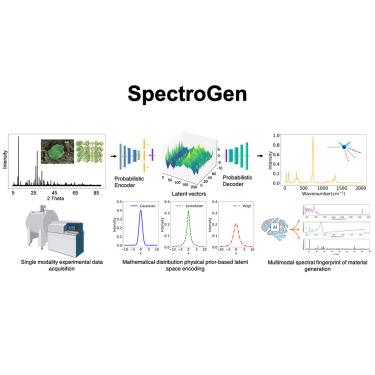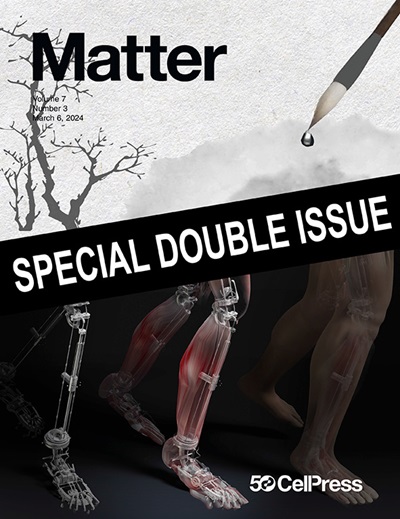SpectroGen:用于加速跨模态光谱材料表征的物理信息生成人工智能
IF 17.5
1区 材料科学
Q1 MATERIALS SCIENCE, MULTIDISCIPLINARY
引用次数: 0
摘要
人工智能(AI)驱动的材料发现提供了新材料成分的快速设计,但合成和表征滞后。特别是,表征仍然是使用专家操作的仪器进行的劳动密集型实验的瓶颈,这些仪器通常依赖于电磁波谱。我们介绍了SpectroGen,这是一个用于跨模态光谱生成的生成式人工智能模型,旨在加速材料表征。SpectroGen可生成高分辨率、高信噪比的光谱,与地面真值的相关性为99%,均方根误差为0.01 a.u。其性能主要由两项关键创新驱动:(1)基于分布的新型物理先验;(2)变分自编码器(VAE)架构。先验将复杂的结构输入简化为可解释的高斯或洛伦兹分布,而VAE将它们映射到物理接地的潜在空间中,以进行精确的光谱变换。SpectroGen广泛应用于光谱领域,并承诺快速,准确的光谱预测,潜在地改变电池材料,催化剂,超导体和药物等领域的高通量发现。本文章由计算机程序翻译,如有差异,请以英文原文为准。

SpectroGen: A physically informed generative artificial intelligence for accelerated cross-modality spectroscopic materials characterization
Artificial intelligence (AI)-driven materials discovery offers rapid design of novel material compositions, yet synthesis and characterization lag behind. Characterization, in particular, remains bottlenecked by labor-intensive experiments using expert-operated instruments that typically rely on electromagnetic spectroscopy. We introduce SpectroGen, a generative AI model for transmodality spectral generation, designed to accelerate materials characterization. SpectroGen generates high-resolution, high-signal-to-noise ratio spectra with 99% correlation to ground truth and a root-mean-square error of 0.01 a.u. Its performance is driven by two key innovations: (1) a novel distribution-based physical prior and (2) a variational autoencoder (VAE) architecture. The prior simplifies complex structural inputs into interpretable Gaussian or Lorentzian distributions, while the VAE maps them into a physically grounded latent space for accurate spectral transformation. SpectroGen generalizes across spectral domains and promises rapid, accurate spectral predictions, potentially transforming high-throughput discovery in domains such as battery materials, catalysts, superconductors, and pharmaceuticals.
求助全文
通过发布文献求助,成功后即可免费获取论文全文。
去求助
来源期刊

Matter
MATERIALS SCIENCE, MULTIDISCIPLINARY-
CiteScore
26.30
自引率
2.60%
发文量
367
期刊介绍:
Matter, a monthly journal affiliated with Cell, spans the broad field of materials science from nano to macro levels,covering fundamentals to applications. Embracing groundbreaking technologies,it includes full-length research articles,reviews, perspectives,previews, opinions, personnel stories, and general editorial content.
Matter aims to be the primary resource for researchers in academia and industry, inspiring the next generation of materials scientists.
 求助内容:
求助内容: 应助结果提醒方式:
应助结果提醒方式:


